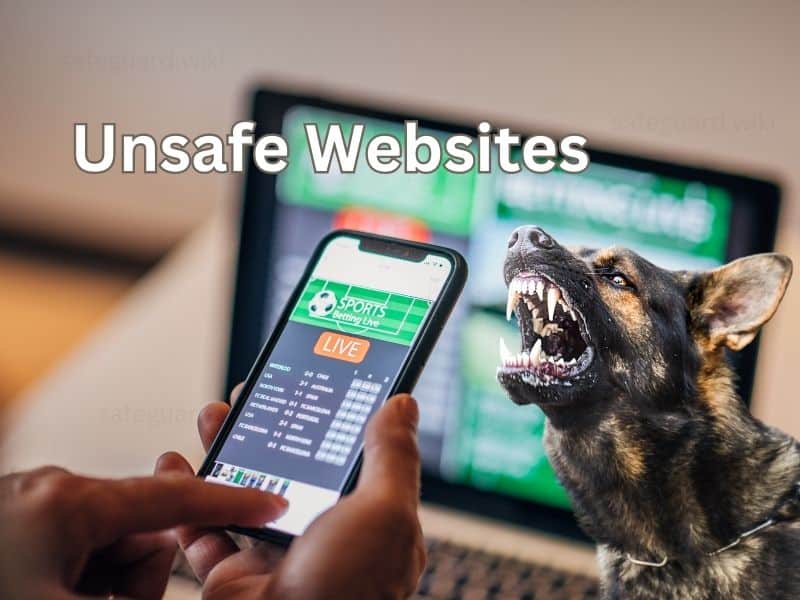Staying Safe in the World of Unsafe Websites
Based on our experience over the past two decades the internet is a magnificent place to explore, but like any vast frontier, it harbors its share of dangers. One of the biggest threats today? Unsafe websites. These are the shark-infested waters of the internet, and today, I’m here to help you navigate them safely.
Understanding the Perils of Unsafe Websites
Before we delve into the heart of the matter, let’s take a moment to truly understand what we’re up against. What exactly makes a website “unsafe”?
Unsafe websites can range from those trying to steal your personal information to those that install harmful software on your computer, all without your knowledge. Imagine someone installing a hidden camera in your home without your consent, peering into your daily life. It’s that invasive! This is why understanding the risks and taking steps to protect yourself is crucial.
Get to Know Your New Best Friends: Security Tools
Your first line of defense against unsafe websites is to arm yourself with reliable security tools. Antivirus software, for example, can protect your device from harmful malware that some unsafe websites might attempt to install. They’re like loyal watchdogs, barking loudly the moment they sense an intruder.
You should also consider a firewall, a digital barrier that helps block unauthorized access to your computer. It’s like your own personal moat, keeping out the unwanted invaders.
Another Trusty Ally: Browser Warnings
Most modern web browsers, including Chrome, Firefox, and Safari, have built-in mechanisms to warn you when you’re about to venture into the territory of unsafe websites. It’s as if you have an experienced guide by your side, warning you of potential pitfalls. Pay heed to these warnings; they’re there for your safety.
Wise Navigation: Checking Website Credibility
If you’re venturing into unknown online territories, do a bit of a background check. Check the website’s URL first. A secure website will often start with “https://†rather than “http://â€. That little “s” stands for secure, and it means the website encrypts your data, making it harder for cyber thieves to get their hands on it.
Word count: 156
Website Reviews: A Preemptive Measure
Let’s not forget about the power of reviews. They’re like trails of breadcrumbs left by others who’ve navigated the path before you. Websites like Trustpilot or even a quick Google search can reveal user experiences and give you a heads-up about potentially unsafe websites.
The Deceptive Nature of Phishing Websites
One of the most common types of unsafe websites is phishing sites. They’re like wolves in sheep’s clothing, mimicking legitimate websites to trick you into giving them your personal information. Always double-check the website’s URL, even if it looks like a site you know. Small changes, like ‘Goggle’ instead of ‘Google’, should raise your guard.
Keep Your Personal Information Close
Here’s the golden rule: never share your personal information unless it’s necessary and you trust the website. Giving out your personal information online is akin to handing out keys to your home. Be stingy with it. Be protective. It’s one of the best ways to steer clear of the dangers posed by unsafe websites.
Regular Software Updates: Your Unsung Heroes
Remember those annoying software updates you keep dismissing? They’re more important than you think. Software companies often release updates to fix security vulnerabilities. By keeping your software updated, you’re effectively fortifying your defenses against unsafe websites. So next time, instead of hitting ‘remind me later’, you might want to consider updating immediately.
The Art of Crafting Strong Passwords
One of the simplest yet most overlooked practices is creating strong, unique passwords. Your password is the key to your digital kingdom, and you wouldn’t want it to be easily picked up by cyber burglars, would you? Using a combination of letters, numbers, and special characters can make it harder for your accounts to be breached.
If you need a hand in creating a strong password you can use one of the many password generators out there. It’s an application or tool that creates complex, random passwords that are extremely difficult, if not impossible, for cybercriminals to crack. Using a mixture of numbers, symbols, and both uppercase and lowercase letters, password generators create strong passwords, often more robust than anything we might come up with on our own. And the beauty of it all? You don’t have to remember these complex creations. Paired with a password manager, you can easily store and use these robust passwords, further fortifying your defense against unsafe websites.
Password Managers: The Safeguard of Your Secrets
If you’re wondering how to remember all those complex passwords, enter the password manager. This tool is your digital diary, storing and encrypting your passwords. It’s like having a secret vault for your most valuable digital possessions, the keys that only you possess.
2-Factor Authentication: Double the Protection
Another effective strategy against unsafe websites is using two-factor authentication (2FA). It’s like having a double-locked door; even if someone manages to crack the first lock, they still have another one to contend with. By requiring a second form of verification, typically sent to your mobile device, 2FA adds an extra layer of security.
Being Wary of Public Wi-Fi
Here’s a surprising fact: Public Wi-Fi networks can be a hotspot for unsafe websites. They’re like public swimming pools; you never really know what’s lurking beneath the surface. If you must use public Wi-Fi, consider using a VPN to encrypt your data and protect your information from prying eyes.
By adhering to these guidelines, you’re far less likely to fall prey to the dangers of unsafe websites. Remember, in the vast ocean of the internet, it pays to be a cautious explorer. It’s better to take a moment to ensure safety than to dive headfirst into potentially shark-infested waters.

Trust, But Verify
Whenever you click on a link, especially in emails or text messages, take a moment to verify where it’s leading. It’s like checking a map before heading out on a journey. Cybercriminals often use misleading links that appear to be legitimate but lead you to unsafe websites. A good practice is to hover over the link without clicking, which allows you to see the actual URL. If it looks suspicious, don’t click!
Safeguarding Children from Unsafe Websites
If you’re a parent, it’s essential to safeguard your children from the hazards of unsafe websites as well. Children are like curious explorers in the world of the internet, often unaware of the dangers lurking around. There are various parental control tools and software that can help you manage and monitor your children’s online activity, helping them to safely navigate the digital world.
Beware of Too-Good-To-Be-True Deals
Sometimes, unsafe websites lure unsuspecting visitors with offers that seem too good to be true. It’s like that old saying, “if it seems too good to be true, it probably is.” These websites may be trying to steal your credit card information or other sensitive data. Always verify the credibility of a website before making any transactions.
Recognize and Avoid Suspicious Pop-ups
Ever come across those annoying pop-up windows when visiting a website? Some of them can lead to unsafe websites. It’s like accidentally stumbling upon a hidden trap. Be wary of pop-ups that insist you’ve won a prize or that scare you with warnings about viruses on your computer. In most cases, it’s best to close these pop-ups from the window’s corner and not click on any links within them.
A Lifeline in Times of Trouble: Regular Backups
Having regular backups of your important data can be a lifesaver if you happen to fall victim to unsafe websites. It’s like having a lifeboat on a ship – you hope you’ll never need it, but you’ll be glad it’s there if you do. Regular backups can help you restore your data if it gets lost or compromised.
The Power of Education: Stay Informed
The world of the internet is ever-evolving, and so are the threats it harbors. Staying informed about the latest cybersecurity threats and how to prevent them is your greatest weapon against unsafe websites. It’s like staying up-to-date with the weather forecast while sailing – it helps you navigate safely and avoid any impending storms.
© 2016-2023 by LiVentures. All rights reserved. No part of this document may be reproduced or transmitted in any form or by any means, electronic, mechanical, photocopying, recording, or otherwise, without prior written permission of LiVentures.


